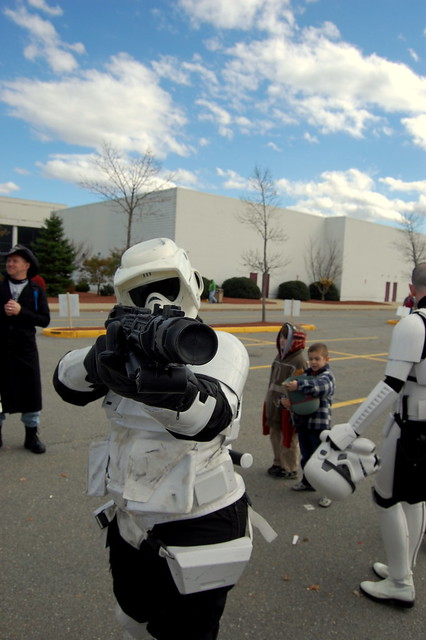 Heather, from the NEG
Heather, from the NEG
Last night, I came across a story out of Chicago about a girl named Katie. Katie lives in Chicago, and for the school year, she had picked out a Star Wars backpack, lunch box and water bottle. She packed her lunch with her mother for a couple of months, before wanting to abruptly switch to a different water bottle. When her mom asked about what happened, the entire story tumbled out: a couple of boys had been making fun of her every day, saying that Star Wars was for boys, and to try and make them stop, she wanted to change.
It's a sad story, and there were a couple of points that struck me. Her mother caught the change in behavior in her daughter, and questioned her on it. One of my past jobs was working at a summer camp, working with boys for a couple of weeks at a time, and kids are strange. Their social interactions are different, as well as their perceptions of what happened. The first, and most important thing out of this whole story is that the problem was caught, identified and Katie was reassured. The article's since gone viral, with the internet showing their support for her, and the fact that there's tons of other women out there reaffirming that it's not only for boys is a good thing.
When it comes to the idea of Star Wars is only for Boys, it's easy to see why that perception is out there. As Erika on Club Jade wrote the other day, it's heavily marketed towards guys, and it has been for years: men make up a large part of the Star Wars universe. That's changing, gradually, that that's good, because it's decidely not the case. The first thing that ran through my mind after reading the article was: "I know a couple of girls who are proof positive that that Star Wars is for everyone.", and went and posted the article to the 501st Facebook wall, soliciting support for Katie. This morning, I've asked for pictures of women in armor.
 Marie, from the Canadian Garrison
Marie, from the Canadian Garrison
The Star Wars universe, (and Science Fiction / Fantasy in general, for that matter), isn't a male-only playground, despite perceptions that it is. Star Wars alone has a number of strong female leads throughout the books, comics, movies and TV show. The same thing goes on with a number of other shows and films throughout the genre in every medium. While there are the strong points, there's the weaker characters that also exist from within, and I'm hopeful that we'll see more characters such as Ashoka Tano, Kara Thrace, Sam Carter and Shan Franklin that will serve as good role models for kids and fans of the genre, which is what will ultimately overturn the general perceptions. Within fandom, I hope to see more people like Vivienne, Megan, Marie, Heather, Terry, Amanda and Jodi, amongst many others, demonstrating their passions like we do in the 501st.
Bullying seems to be a hot button issue at the moment, between the 'It Gets Better' campaign that's been working its away across the country, as well as countless other stories that appear: kids humiliated for being who they are, which is possibly the worst thing for their self-esteem, outlook on life and general health. Bullies can be powerful motivators with the right environment: a problem to overcome, or they can be detrimental. I hope that most kids can learn to move above the problems, but it's something that takes patience, work and the right attitude.
When I was in elementary school, there was a girl who was different: Angela. I remember some of my classmates making fun of her for something stupid, and I had joined in at one point. I can't imagine that she was happy there. At one point, she fell or hurt herself on the playground, and I remember stopping to ask if she was okay, or waiting with her while a teacher came up. I've always regretted making fun of her then, and I hope that wherever she ended up, she's overcome our mindless thoughts and inconsiderate behavior at that age. As I became more of a geek in middle and high school, I came across my share of bullies, who made fun of the books I read, my glasses and clothing. It made me an angry kid at times, but I'd like to think that I made it out okay with a bit of maturity. Talking with some friends, I got off easy, and I feel for the kids who have worse troubles than I ever did.
Star Wars is for Everyone, and it's in a unique place in that it has a major, world-wide build in community of fans who have a similar interest, regardless of gender, race, class or orientation.
Take a look at the growing gallery of 501st women that we've collected, and spread the word: Star Wars is for Everyone, and Bullying is not okay.


 Heather, from the NEG
Heather, from the NEG Marie, from the Canadian Garrison
Marie, from the Canadian Garrison